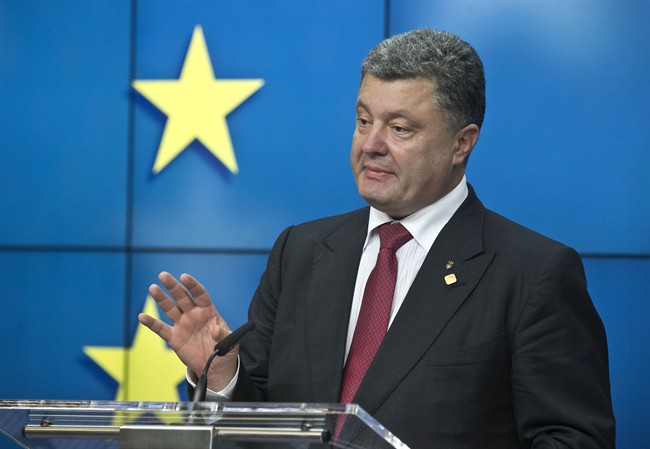KIEV, Ukraine – Ukraine’s president spoke with the leaders of Russia, Germany and France on Monday to figure out how best to resolve the deadly conflict with pro-Russian separatists in the east.

The telephone call between President Petro Poroshenko, Russia’s Vladimir Putin, Germany’s Chancellor Angela Merkel and France’s Francois Hollande took place as an expiration deadline neared for Ukraine’s shaky, unilateral cease-fire.
READ MORE: Ukraine calls on Russia to support peace plan
Poroshenko has already extended the cease-fire from seven days to 10 as part of a peace plan to end the conflict that has killed more than 400 people. National security spokesman Andriy Lysenko said the decision would come before the cease-fire expires at 10 p.m. (1900 GMT, 3 p.m. EDT).
The cease-fire has been continuously broken, however, and rebels have not laid down their weapons as Poroshenko demanded.
French officials said the phone call touched on establishing a full cease-fire by both sides, having international monitors on the border between Russia and Ukraine, freeing prisoners and holding substantial talks with Ukraine’s separatist rebels.
A Kremlin statement said foreign ministers from the four countries would carry the four-way talks – a distinct cold shoulder to efforts from the United States or the full European Union to be further involved in Ukraine’s protracted crisis.

Get breaking National news
European leaders have urged Russia to use its influence with the rebels to de-escalate the conflict. They have said they could impose another round of financial sanctions against Russia if the conditions for a continuing cease-fire are not met. The four leaders also had talked Sunday.
Sporadic fighting still flared Monday despite the cease-fire. Shelling killed at least two people and ruined several apartments in the rebel-held city of Slovyansk in the eastern region of Donetsk.
Poroshenko has demanded that rebels return posts along the Russia border to Ukrainian control and allow international monitors to verify the cease-fire. Rebels in the past have kidnapped several teams of monitors.
READ MORE: Russia, Ukraine should set up mechanism to oversee cease-fire
Poroshenko says his unilateral cease-fire is a first step to give rebels a chance to lay down their arms. Further steps would include an amnesty for separatists who have not committed serious crimes, early local elections and changes in the constitution to decentralize power to Ukraine’s regions.
In Slovyansk, shooting kept up through the night and into Monday morning, growing heavy at times. Residents saying the army appeared to start shelling after rebels opened fire.
Some of the shelling appeared to be directed at rebel front-line positions but other shells landed in a residential neighbourhood, destroying or damaging several buildings.
One woman, 62-year-old Vera Sayenko, died when a shell hit her ninth floor apartment, neighbours told an AP journalist, as well as another woman during shelling.
“Everything we have collected in our life is destroyed. We have become poor,” said Valery, whose apartment was also destroyed. He would not give his last name. “Show all Ukrainians what happened here. What else do they want, to ruin the town and kill people?”
Ukrainian police and prosecutors were also investigating the death of a cameraman working for Russia’s Channel One. Anatoly Klyan, 68, was fatally wounded late Sunday when a bus carrying journalists and soldiers’ mothers was hit by gunfire as it approached a military base in eastern Ukraine after dark north of the city of Donetsk.
Russia’s Foreign Ministry blamed the attack on Ukrainian soldiers and demanded an objective investigation.
Klyan was the fifth journalist to die since the fighting began in April.
The conflict in eastern Ukraine began after a protest movement among those seeking closer ties with the EU prompted President Viktor Yanukovych to flee in February. Calling it an illegal coup, Russia seized and annexed Ukraine’s Crimea region in March, saying it was protecting Russian speakers. The insurrection in the east began shortly afterward.
Ukraine signed a trade and political deal with the EU last week, the one that Yanukovych had rejected.







Comments